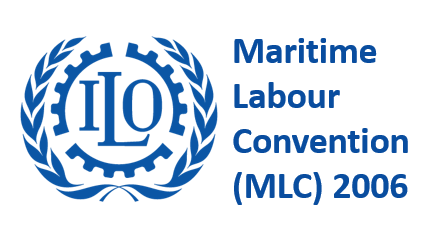The International Labour Organisation (ILO) adopted the Maritime Labour Convention in 2006 (hereinafter referred to as MLC, 2006). MLC 2006 is intended to establish the rights and safety of the more than 1.2 million seafarers in the world. The convention does this by updating the many international laws and standards in the maritime sector.
Before MLC 2006, there were many conventions, laws and standards that had not been ratified. States interpreted the conventions differently and the rules for shipowners and seafarers differed from country to country. When various seafarers' organizations, shipowners and governmentsstarted working together in 2001, it was with the aim of creating a tool that could be used globally,irrespective of flag. This tool was intended to cover all present requirements for seafarers' workingconditions. It would give seafarers some clear, standardized rights while ensuringuniformcompetitive conditions for shipowners operating quality shipping. This is to be achieved by thegeneral standards included in the convention which can be applied everywhere in global shipping.The result of this process is the Maritime Labour Convention (MLC 2006).
5.2 MLC2006-Regulation3.2-Food and catering
Purpose: To ensure that seafarers have access to good quality food and drinking water provided under regulated hygienic conditions.
1. Each Member shall ensure that ships that fly its flag carry on board and serve food and drinking water of appropriate quality, nutritional value and quantity that adequately covers the requirements of the ship and takes into account the differing cultural and religious backgrounds.
2. Seafarers on board a ship shall be provided with food and beverage free of charge during the period of engagement.
3. Seafarers employed as ships' cooks with responsibility for food preparation must be trained and qualified for their position on board ship.
Standard
Standard A3.2 - Food and catering
1. Each Member shall adopt laws and regulations or other measures to provide minimum standards for the quantity and quality of food and drinking water and for the catering standards that apply to meals provided to seafarers on ships that fly its flag, and shall undertake educational activities to promote awareness and implementation of the standards referred to in this paragraph.
2. Each Member shall ensure that ships that fly its flag meet the following minimum standards:
(a) food and drinking water supplies, having regard to the number of seafarers on board, their religious requirements and cultural practices as they pertain to food, and the duration and nature of the voyage, shall be suitable in respect of quantity, nutritional value, quality and variety;
(b) the organization and equipment of the catering department shall be such as to permit the provision to the seafarers of adequate, varied and nutritious meals prepared and served in hygienic conditions; and
(c) catering staff shall be properly trained or instructed for their positions.
3. Shipowners shall ensure that seafarers who are engaged as ships' cooks are trained, qualified and found competent for the position in accordance with requirements set out in the laws and regulations of the Member concerned.
4. The requirements under paragraph 3 of this Standard shall include a completion of a training course approved or recognized by the competent authority, which covers practical cookery, food and personal hygiene, food storage, stock control, and environmental protection and catering health and safety.
5. On ships operating with a prescribed manning of less than ten which, by virtue of the size of the crew or the trading pattern, may not be required by the competent authority to carry a fully qualified cook, anyone processing food in the galley shall be trained or instructed in areas including food and personal hygiene as well as handling and storage of food on board ship.
6. In circumstances of exceptional necessity, the competent authority may issue a dispensation permitting a non-fully qualified cook to serve in a specified ship for a specified limited period, until the next convenient port of call or for a period not exceeding one month, provided that the person to whom the dispensation is issued is trained or instructed in areas including food and personal hygiene as well as handling and storage of food on board ship.
7. In accordance with the on going compliance procedures under Title 5, the competent authority shall require that frequent documented inspections be carried out on board ships, by or under the authority of the master, with respect to:
(a) supplies of food and drinking water;
(b) all spaces and equipment used for the storage and handling of food and drinking water; and
(c) galley and other equipment for the preparation and service of meals.
8. No seafarer under the age of 18 shall be employed or engaged or work as a ship's cook.
Guideline
Guideline B3.2 - Food and catering
Guideline B3.2.1 - Inspection, education, research and publication
1. The competent authority should, in cooperation with other relevant agencies and organizations, collect up-to-date information on nutrition and on methods of purchasing, storing, preserving, cooking and serving food, with special reference to the requirements of catering on board a ship. This information should be made available, free of charge or at reasonable cost, to manufacturers of and traders in ships' food supplies and equipment, masters, stewards and cooks, and to shipowners' and seafarers' organizations concerned. Appropriate forms of publicity, such as manuals, brochures, posters, charts or advertisements in trade journals, should be used for this purpose.
2. The competent authority should issue recommendations to avoid wastage of food, facilitate the maintenance of a proper standard of hygiene, and ensure the maximum practicable convenience in working arrangements.
3. The competent authority should work with relevant agencies and organizations to develop educational materials and on-board information concerning methods of ensuring proper food supply and catering services.
4. The competent authority should work in close cooperation with the shipowners' and seafarers' organizations concerned and with national or local authorities dealing with questions of food and health, and may where necessary utilize the services of such authorities.
Guideline B3.2.2 - Ships' cooks
1. Seafarers should only be qualified as ships' cooks if they have:
(a) served at sea for a minimum period to be prescribed by the competent authority, which could be varied to take into account existing relevant qualifications or experience;
(b) passed an examination prescribed by the competent authority or passed an equivalent examination at an approved training course for cooks.
2. The prescribed examination may be conducted and certificates granted either directly by the competent authority or, subject to its control, by an approved school for the training of cooks.
3. The competent authority should provide for the recognition, where appropriate, of certificates of qualification as ships' cooks issued by other Members, which have ratified this Convention or the Certification of Ships' Cooks Convention, 1946 (No. 69), or other approved body.
5.3 Guidelines for Flag State / Port State inspections under MLC, 2006
5.3.1 Basic requirements
• Food and drinking water must be of appropriate quality, nutritional value and quantity, taking into account the requirements of the ship and the differing cultural and religious backgrounds of seafarers on the ship.
• Food is to be provided free of charge to seafarers during the period of engagement.
• Seafarers employed as ship’s cooks with responsibility for preparing food must be trained and qualified for their positions.
• Seafarers working as ship’s cooks must not be less than 18 years old.
• Frequent and documented inspections of food, water and catering facilities are carried out by the master or a designate.
* “Ship’s cook” means a seafarer with responsibility for food preparation.
5.3.2 How to check the basic requirements
• Check documents to confirm that the ship’s cooks are 18 years old or older and that the ship’s cooks are trained, qualified and competent for their positions in accordance with national requirements. In cases where a fully qualified cook is not required, check that sea farers processing food in the galley are trained or instructed in food and personal hygiene and handling and storage of food on board ships.
• Check on-board records to confirm that frequent and documented inspections are made of supplies of food and drinking water;
• spaces used for handling and storage of food;
• galleys and other equipment used in the preparation and service of meals.
• Visual observation of catering facilities, including galleys and store rooms, to check that they are hygienic and fit for purpose.
• Check that food and drinking water are of an appropriate quality (for example, not out of date) and quantity and nutritional value by:
• checking drinking water quality and ascertaining how the quality is monitored;
• reviewing menu plans together with visual observation of food supplies and storage areas to ensure that the food sup plied is varied in nature.
• Check, by interviewing, in private, a representative number of seafarers, that they are not charged for food and are provided with drinking water and that food and drinking water are of appropriate quality and quantity.
5.3.3 Examples of deficiencies
• Food and drinking water are not of appropriate quality, nutritional value and quantity, for the seafarers on the ship.
• Seafarer is charged for food and/or is not provided with drinking water.
• Seafarer who has responsibility for preparing food is untrained or not instructed as required.
• Ship’s cook is not trained and qualified.
• Ship’s cook is under 18 years of age.
• Frequent and documented inspections of the food or water or the preparation/storage/handling areas are not being carried out.
• Catering facilities are not hygienic or are otherwise unfit for purpose.



